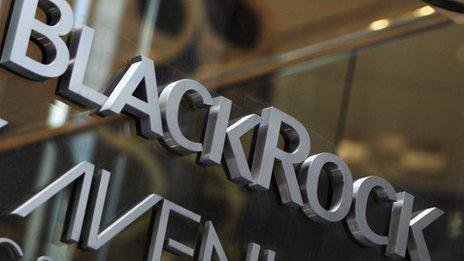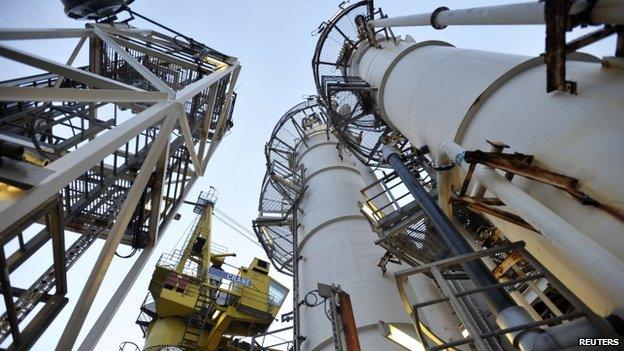Scottish independence: Blackrock warns of post-Yes risks for UK and Scotland
- Published

The Blackrock report said that it believed a separate Scottish currency would be the best option
The world's biggest investment fund manager has said Scottish independence would bring "major uncertainties, costs and risks".
Blackrock's assessment was that those risks would be "mostly for Scotland, but also for the remaining UK".
The report comes as an academic's analysis strongly disputed the UK Treasury's rejection of a currency union post-Yes.
Voters in Scotland will decide their country's future on 18 September.
They will be asked the "Yes/No" question: "Should Scotland be an independent country?"
Blackrock, which is based in New York and manages trillions in financial assets, will be sending out its 12-page assessment to clients next week.
It said a currency union between an independent Scotland and the rest of the UK "looks infeasible" and would "bring risks to both countries".
The asset managers believed the "best of the few choices" Scotland had would be to launch its own currency.
The company said oil and gas were critical to Scotland's finances but fiscal spending based on specific oil revenue projections was "uncertain and probably unwise".
It reported that banks and insurers would face pressure to move headquarters to a "stronger fiscal state with a more certain regulatory backdrop".
However, the report added: "A wholesale exodus of staff and operations would be unlikely, given Scotland's cost advantage over London and other locations."
Blackrock also said that fears an independent Scotland would become a "bastion of anti-business sentiment are unfounded, in our view".
It said: "The Scottish government would likely go out of its way to accommodate the oil industry in particular. Why risk killing the Scottish grouse that lays the golden egg?"
On the issue of renewable energy, Blackrock said both sides had merit in their arguments.
It recognised the UK position that at present Scotland received a third of UK subsidies for renewable energy, although it represented less than a tenth of the UK's population.
However, it also recognised the pro-independence position that Scotland would no longer need to help fund the UK's nuclear programme.

The report looked at revenues from the oil and gas sector
Blackrock's assessment came as Leslie Young, professor of economics at a university in Beijing, claimed the Treasury's currency position did not stand up to scrutiny.
He was commissioned by businessman Sir Tom Hunter's new institute to assess the case against a currency union between an independent Scotland and the rest of the UK.
Sir Tom is funding academic reports, research and polling in a bid to help people better understand the issues in the referendum, while he says he remains undecided on his vote.
Currency view differences
Blair McDougall, of the pro-Union Better Together campaign, said that the report by Blackrock was "a serious piece of work from experts in managing money".
He added: "The SNP cannot dismiss this as they have every other warning from experts, employers and economists.
"Being part of the UK means lower costs, more jobs and better opportunities for future generations. Losing the pound means losing the strength, stability and security of the UK economy."
A Scottish government spokesman responded to the Blackrock report by saying: "The Fiscal Commission Working Group, which comprises economic experts and including two Nobel Laureates, has considered a range of currency options in its detailed report published a year ago, and concluded that it is in the interests of both Scotland and the UK to continue to retain Sterling in a formal monetary union, and that is the policy the Scottish Government proposes.
"A currency union is in the UK's overwhelming economic interests due to the vast contribution Scotland makes to the Sterling Area, including its valuable contribution to the UK's balance of payments.
"Standard & Poor's published analysis showing that Scotland has a rich and diversified economy, with wealth levels comparable to those of AAA rated countries and that Scotland would qualify for their highest economic assessment."